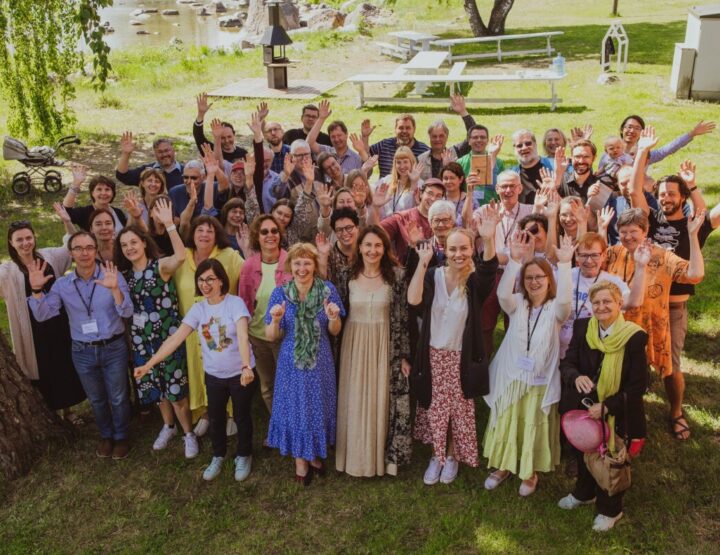Every four years the Estonian Literature Information Centre summons together translators from all over Europe who are active and interested in propagating the literature of Estonia in other countries. This year it was time for another such gathering, and as before, the venue was the delightful seaside village of Käsmu, on a little peninsula halfway along Estonia’s northern coast. For three days, from 18th to 21st May, 31 translators were able to meet, get acquainted, exchange views, enjoy the warm weather and come face to face with some of Estonia’s best current prose authors, critics and poets – both established and up-and-coming. The 31 of us came from Finland, Poland, Hungary, Russia, Sweden, Norway, France, Latvia, Lithuania, Germany and Britain. I was one of the contingent from Britain, and I was attending this regular gathering for the first time, so I was keeping an open mind about what to expect.
The programme of the seminar was tight enough to be always interesting and challenging, yet loose enough to encourage plenty of free discussion and camaraderie – not just among ourselves but also with those writers who stayed for the duration. The Estonian Writers’ Union maintains a house – an old sea captain’s residence – where visiting writers can stay, so we were able to enjoy the company of such well-known figures as Doris Kareva, Arvo Valton and Jaan Kaplinski.
So what was on offer? A mixture of surveys of the current literary scene in prose fiction, poetry and drama, and samples of the authors’ own work. Janika Kronberg gave us a wide-ranging picture of the current scene in the Estonian novel, picking out examples that a worth considering for translation for the wider world. Jan Kaus presented a selection of the leading contemporary poets, including Jürgen Rooste, Elo Viiding, Kivisildnik, Kalev Kesküla, Mats Traat, and Kristiina Ehin – who was herself on hand for a reading from her latest volume Kaitseala (“Protected Area” or “Reserve”) on the veranda of the Seamen’s Museum, a lovely setting, on the last evening of our stay. – and several more.
Drama was not neglected either – Piret Kruuspere gave us a pretty thorough survey of recent writing for the Estonian theatre. Theatre is a harder subject than poetry or fiction to present to an audience in a seminar setting, as it can’t be performed live in the classroom. Essays and literary criticism were covered in a talk by Märt Väljataga, surveying the last four years’ activity in the field.
Perhaps the most exciting element of the seminar, though, was the opportunity to get introduced to many of the writers themselves. Not only the more established writers whom I mentioned above were present, but also some of those in the first flush of a literary breakthrough – and no doubt keen to reach a wider audience – such as Olavi Ruitlane, who writes in the South Estonian Võru dialect, Urmas Vadi, Lauri Pilter, Rein Raud, as well as Eeva Park, who is well known in Estonia by now but yet to reach wider foreign audiences. Given the lovely sunny weather, we moved outdoors on our last afternoon, and were also joined by the young novelist Peeter Sauter to talk about his work.
It was not all hard intellectual work, though. Participants were treated to an excursion to Viinistu, on the next peninsula to the west, where the local boy who made good, Jaan Manitski, former manager of ABBA, has returned to his birthplace and transformed an old fishing co-operative from Soviet times into a remarkable restaurant and cultural centre. His collection of Estonian paintings which fills one of the buildings, transformed for the purpose but still bursting at the seams, was truly staggering.
Plenty of time for getting to know each other was provided – on a summer evening the sauna and the outdoor barbecue are ideal places for chatting away until the sun sets – if it ever does – and beyond. What should a first-time visitor to Käsmu like myself expect? I had a notion perhaps that we might have formal sessions of discussing our own actual problems in translating Estonian literature, but this is not what happened, and on reflection, how could it? We all come from different language backgrounds, we have differing degrees of familiarity with Estonia and its literature, have translated different works, and so our individual problems are bound to be all different. Better by far was what actually happened – an opportunity to meet and talk with the very authors whose work we might already be tackling, or if not, might now feel inspired to tackle!
There is talk of making the Käsmu seminar more frequent – every two years instead of every four. I for one would be all in favour of this. Back here in England I’m already missing Estonia and the unique atmosphere of Käsmu.


